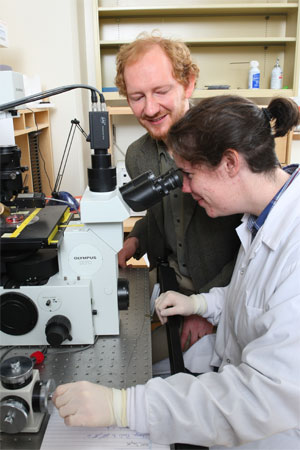 |
| Professor Geoff Maksym, here withĀ PhD student Sarah Connolly, has developed a handheld device ā called an āoscillation spirometerā ā that will give doctors a new sensitive tool to measure airway function.Ā (Nick Pearce Photo) |
At pilipiliĀž»ās School of Biomedical Engineering, faculty members like to talk about ātechnology for life.ā
Thatās a concept that connects basic research of biomedical devices to quality of lifeālinking discoveries made in the laboratory more directly to patient health.
At the school, thatās done through teams of students and professors that bring together a combination of skills and expertise: the biomedical engineer with the ear surgeon to improve hearing aids,Ā or the biomechanist with the orthopedic surgeon to design more effective implants for knee replacement surgery.
And now those kinds of multi-disciplinary collaborations are being strengthened through a $1.6 million grant from the Natural Sciences and Engineering Research Council of Canada's (NSERC) new Collaborative Research and Training Experience Program, or CREATE for short.
The money will allow the school to recruit and support top students for its masterās, PhD and post doctoral programs starting this fall, create core courses and workshops on biomedical technologies and set up work placements for students at medical device companies.
One course, for example, will provide an introduction to clinical settings and focus on identifying gaps in biomedical technologies. Another course will explore entrepreneurship and the business of bringing medical devices to market.
āThe three pillars of this program are to provide formal education in a clinical setting, an industrial setting and in core science and engineering,ā says Cheryl Kozey, the schoolās interim director and one of three co-principal investigators for NSERCās CREATE, along with biomedical engineer Geoffrey Maksym and ear surgeon Manohar Bance.
āThe industry training component is the new piece and makes us truly unique. The idea is to have students better prepared for positions in industry and to move research and development from the Ivory Tower to the real world.ā
The students will work with the schoolās facultyāa multidisciplinary group including clinicians, surgeons, engineers and basic scientistsāto expand on biomedical research, such as improving diagnostic devices for respiratory diseasesĀ and building better and safer wheelchairs. Faculty members come to the school from across the university, representing the Faculties of Medicine, Engineering, Dentistry, Science, and Health Professions.
āYou need these combinations of skills and knowledge to effectively do research that will make a difference,ā she adds. āItās translational research thatĀ truly enables taking our research from bench to bedside.ā
The pilipiliĀž» initiative is a team effort with industry and is supported by medical device companies including BioNova, InnovaCorp, Cochlear Corporation and Halifax Biomedical, to name a few.
āWeāre seeing outstanding enthusiasm from stakeholders for this initiative," says Dr. Kozey.Ā "They recognize that Halifax is an excellent location for medical research and development. The Faculties of Medicine, Engineering and Health Professions are all close together near the clinical hospitals where clinicians and their patients are located ā¦ this program promises to be a strong stimulus for growth in this industry right here in Halifax.ā
LINKS: Ģż“„
